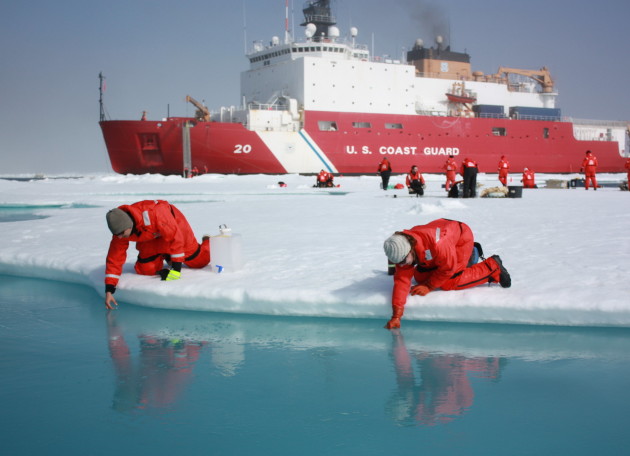Topics: Earth and Life Sciences
Type: Discussion papers
Publication date: June 2020
Download
Summary
Authors: Professor Martin Siegert, Professor Sheldon Bacon, Dr David Barnes, Professor Ian Brooks, Henry Burgess, Professor Finlo Cottier, Dr Duncan Depledge, Professor Klaus Dodds, Professor Mary Edwards, Professor Richard Essery, Professor Karen Heywood, Dr Katharine Hendry, Professor Vivienne Jones, Dr James Lea, Dr Ingrid Medby, Professor Mike Meredith, Professor James Screen, Professor Philip Steinberg, Professor Geraint Tarling, Dr James Warner, Dr Gillian Young
 This discussion paper explains how the UK’s climate is linked to conditions in the Arctic, and why a UK Arctic science strategy is integral to understanding how global warming will change the Arctic and affect the UK.
This discussion paper explains how the UK’s climate is linked to conditions in the Arctic, and why a UK Arctic science strategy is integral to understanding how global warming will change the Arctic and affect the UK.
Headlines
-
The Arctic has warmed by around 2°C since 1850, approximately double the global average. Even if the Paris Agreement successfully limits global warming to a further 0.5°C, the Arctic is expected to warm by at least another 1°C.
-
The United Kingdom’s (UK) weather is linked to conditions in the European Arctic. For example, high atmospheric pressure in the Nordic Seas divert damaging storms across the UK and mainland Europe, with the potential to cause societal disruption from flooding.
-
It is possible, although presently unconfirmed, that alterations in Arctic conditions provoked the ‘Beast from the East’ winter storm in 2018.
-
Scientists need to take observations and improve their understanding of climatic processes in the Nordic Seas and the Arctic Ocean to fill gaps in knowledge about the links between the Arctic climate and the UK’s weather; a risk identified by the Intergovernmental Panel on Climate Change (IPCC).
-
The UK has significant research expertise and experience to understand how global warming will change the Arctic’s environment and affect the UK.
-
This strength, allied with the capabilities of the UK’s new polar research ship the RRS Sir David Attenborough, warrants an integrated programme of research, including advanced numerical modelling, to improve predictions of future extreme weather events.
-
Such a programme must acknowledge that the Arctic is politically an increasingly congested and contested space. It should be designed in collaboration with key Arctic and near-Arctic nations to increase the UK’s influence and ability to prepare, respond and plan for future extreme weather events.
Download: The Arctic and the UK: climate, research and engagement [PDF]
[Image credit: Scientists scoop water from melt ponds on sea ice in the Chukchi Sea as part of the ICESCAPE mission (c) NASA/Kathryn Hansen]
'Learning from ice': Listen to a Planet Pod podcast with Professor Siegert discussing what studying core samples from over 2.5 million years ago can tell us about the likely impact of climate change today. Tune in to the podcast here.
View publications by:
Topic
Climate Science
Earth and Life Sciences
Energy and Low-Carbon Futures
Resources and Pollution
Economics and Finance
Health
View all publications and browse by year
Publication type
Briefing papers and Briefing notes
Grantham Institute Outlooks
Evidence & submission papers
Infographics